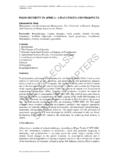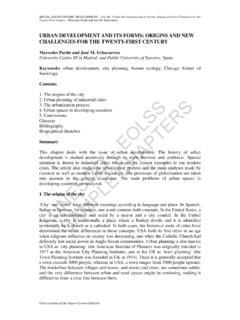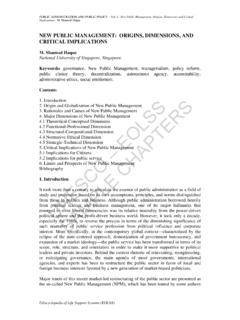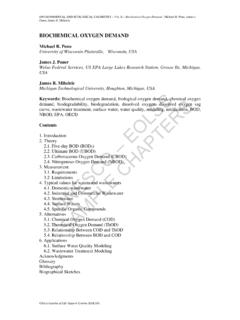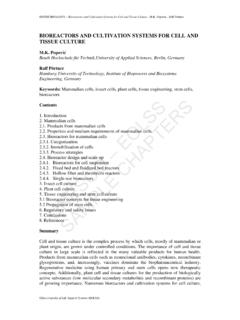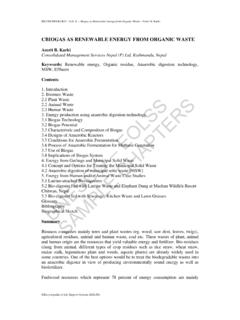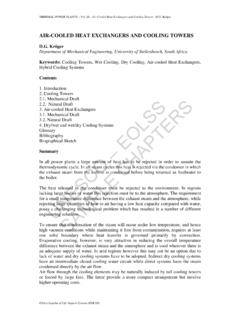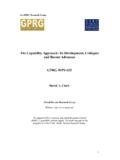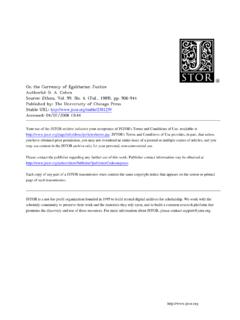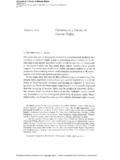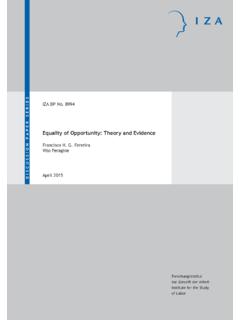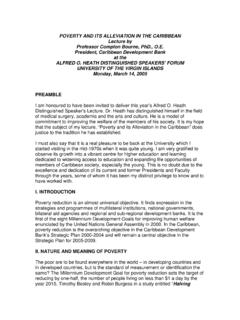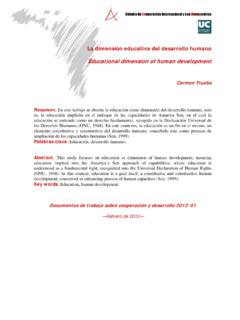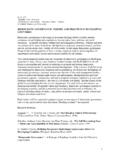Transcription of Major Issues in Human Development - …
1 UNESCO EOLSSSAMPLE CHAPTERSSUSTAINABLE Human Development IN THE TWENTY-FIRST CENTURY Vol. I - Major Issues in Human Development - John Kantner Encyclopedia of Life Support Systems (EOLSS) Major Issues IN Human Development John Kantner Professor Emeritus, Johns Hopkins University,USA Keywords: Diversity, statistical diversity, categorical diversity, governance, community, basic needs. Contents 1. Human Development : What it means 2. Traditionalism vs Universalism in the definition of Human rights 3.
2 Measuring Human Development 4. Diversity: Consequences for Human Development 5. Why Measure Human Development 6. Foreign Assistance and Human Development 7. Prospects for Human Development 8. Disciplinary Approaches to Human Development Glossary Bibliography Biographical Sketch Summary A wide-ranging consideration of some of the Major Issues in Human Development begins with the question of what the term means. It then takes up the question of the dynamics of the transition from conditions that restrict Human Development , often ascribed to traditionalism to the adoption of less provincial, more universal values generally ascribed to modernization.
3 Brief attention is given to the measurement of Human Development in which emphasis is given to the importance of striking a balance between what is feasible in terms of the availability of comparable data for nation states and the fullest rendering of the concept of Human Development . Since a prominent feature of many large societies is their compositional diversity, the consequences for Human Development of social, cultural, economic and political diversity importance is touched on briefly.
4 The question of how to measure Human Development having been raised, it is perhaps useful to ask why bother, what are the aims of the exercise? In a world of increasing interaction and interdependence less advantaged nations rarely confront the problems of Development and the enhancement of the quality of life for its citizens unaided. It is in the interest of more developed nations to render assistance either out of humanitarian concerns, a quest for peace and stability in international relations or the security of commercial and other relationships.
5 Foreign assistance often transmutes into interventions into local affairs in ways that can affect Human Development . This possibility is noted and left, as in the case of the consequences of diversity, for more definitive treatment in the disciplinary perspectives that follow in subsequent chapters The prospects for future Human Development are briefly reviewed and blended into an introduction to the disciplinary perspectives on Human Development which complete this section.
6 On Human Development . UNESCO EOLSSSAMPLE CHAPTERSSUSTAINABLE Human Development IN THE TWENTY-FIRST CENTURY Vol. I - Major Issues in Human Development - John Kantner Encyclopedia of Life Support Systems (EOLSS) 1. Human Development : What it Means The term Human Development has a variety of usages. It is, perhaps most commonly, used to refer to practices of Human nurturance that relate to the shaping of Human personality and the Development of those traits, characteristics and behaviors that, together, define an individual s Human potential or in Amartya Sen s term, her/his capabilities.
7 Human potential or capability in this sense arises out of an individual s psychological environment which determines the nature of the process of maturation - the Development of a sense of self and self worth; an ego structure that governs involvement in social interaction; a capacity for moral judgement; a repertoire of coping skills for life course contingencies, motivational energy and orientation - in short; a personality variously equipped with its capabilities . A second usage, distinct from but not unrelated to the first, relates to the chances individuals have, whatever their potential, to pursue and achieve material and psychological security, to determine the direction of their affairs, to enjoy freedom of expression and action and to be governed by a system based on principles of fair and reliable treatment.
8 In this sense, the focus is on the system, on the opportunities and constraints that must be seized or overcome, rather than on individual capacity. Individual rights, privileges, freedoms and treatment are, of course, central to any discussion of Human Development but here the question becomes, given a population with a range of genetically based and learned potential (capabilities), what are the conditions that are favorable for its full release and what conditions conspire to deny it?
9 As a reviewer of a book entitled The Capabilities Approach, (2) puts it, The capabilities approach is really a theory of freedom as positive (3). The conditions affecting the release of Human potential or the Development of individual capability are to be found in the realm of social structure, in the limits imposed by demographic character and ecological organization. The difference in these two uses of Human Development is a simple difference between the individual and the collectivity, between part and whole.
10 Can a descendent of the aboriginal Maori of New Zealand become a foremost interpreter of the exquisitely romantic arias of Mozart and Richard Strauss? Of course. It has happened. But do the present day Maori as a minority population in New Zealand rank high on the scale of Human Development as conventionally measured? Obviously not, for few of its members have attained the levels of survivorship, education, and economic status that are considered minimal requirements for a population to rank above average in Human Development .
